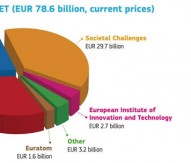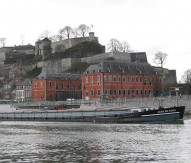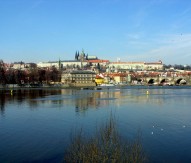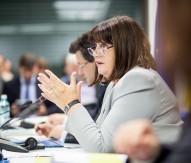
Lithuania rising in RDI
The Republic of Lithuania joined the EU in 2004 and will host its first Presidency of the Council of European Union between July and December 2013. With political decision making on Horizon 2020 yet to formally close, final agreement on the next framework programme will be a key priority for Vilnius in preparation for 1 January 2014.
Ahead of the Presidency, Professor Dr Dainius Pavalkis, Minister of Education and Science, spoke to Horizon2020projects.com and highlighted the importance of international collaboration to helping develop Lithuania’s RDI base.
What are your reflections on Lithuania’s participation in FP7?
Active participation in European research programmes is very important to Lithuania since it allows us to further integrate into the European Research Area, benefitting both our researchers and our country as a whole. The success rate of our participation in the Seventh Framework Programme is close to the EU average – it currently places us right in the middle, Lithuania being number 14 among 27 EU member states.
It is encouraging to see the number of Lithuanian participants growing year by year, it has more than doubled since 2009. Lithuania most actively participates in research for the benefit of SMEs, ICT and transport programmes. Our researchers show the strongest performance in space, nanosciences and nanotechnologies. Overall, participation in European research programmes allows us to significantly boost our research potential.
What action is the government taking to encourage more investment in R&D and develop greater innovation in Lithuania?
During the last few years, a major overhaul of the Lithuanian research system has been taking place using European structural and national funding. State research institutions were consolidated to make them stronger and more visible internationally. New infrastructure and laboratories are being added, making sure Lithuanian researchers have modern instruments at their disposal.
Lithuania is also renewing its research base and creating five integrated science, study and business centres, modelled on Silicon Valley, thus encouraging research and business to come together to create innovative products of high added value. The valleys are developed with a view to building up research, studies and knowledge economy clusters at international level and consolidating the long-term foundation for the competitiveness of Lithuania’s economy.
We have also been undertaking a wide array of initiatives to enhance research and business abilities and participation in the European framework programmes. In order to encourage companies to invest in R&D, tax incentives have been implemented. We have also been focusing on developing the career of researchers by implementing several schemes, such as drawing students’ attention to research opportunities and promoting Lithuanian R&D activities to attract local and international talent.
How important is international collaboration in the field of R&D to Lithuania?
We believe that multilateral collaboration strengthens ties between countries, bringing the world closer together towards better understanding key problems and finding solutions. Currently, we have over ten active international R&D partnerships.
In today’s globalised environment, advancing international co-operation between researchers in different countries is more important than ever. Research tasks can be accomplished much faster when the best minds in a particular field come together. Working on joint projects, researchers not only multiply the efforts to achieve particular results, but also develop and maintain networks, share expertise and resources and develop new ideas and solutions.
Lithuania is committed to further enhancing international co-operation while implementing joint research initiatives and providing them with guidance and financial support.
How would you define success for Lithuania in Horizon 2020?
As partners in the current presidency trio, we are working on opening the gate for the upcoming EU research and innovation initiative. Horizon 2020 is not only a new cycle of the EU research and innovation funding programmes, it also seeks to deliver new growth, ideas and jobs for the future, as well as tackle the main societal challenges in Europe. Being at the forefront of innovative solutions to modern challenges, research collaboration is extremely important. Research efforts are not only solving everyday problems, but also can provide Europe with the competitive edge in today’s globalised market.
I hope that Lithuania’s participation will increase and many more Lithuanian researchers will join the European framework of RDI and make use of new collaborative opportunities. It is a win-win situation for everyone and the benefits are mutual; growing success for Lithuanian researchers will translate to growing Lithuania and growing Europe.
The timely launch of Horizon 2020 is equally crucial both for Europe and for Lithuania. The Lithuanian Presidency will strive to allow Horizon 2020, including the European Institute of Innovation and Technology and EURATOM, to start from the beginning of 2014.
The Presidency will also endeavour to find appropriate and timely solutions for initiatives implementing Horizon 2020.
Professor Dr Dainius Pavalkis




